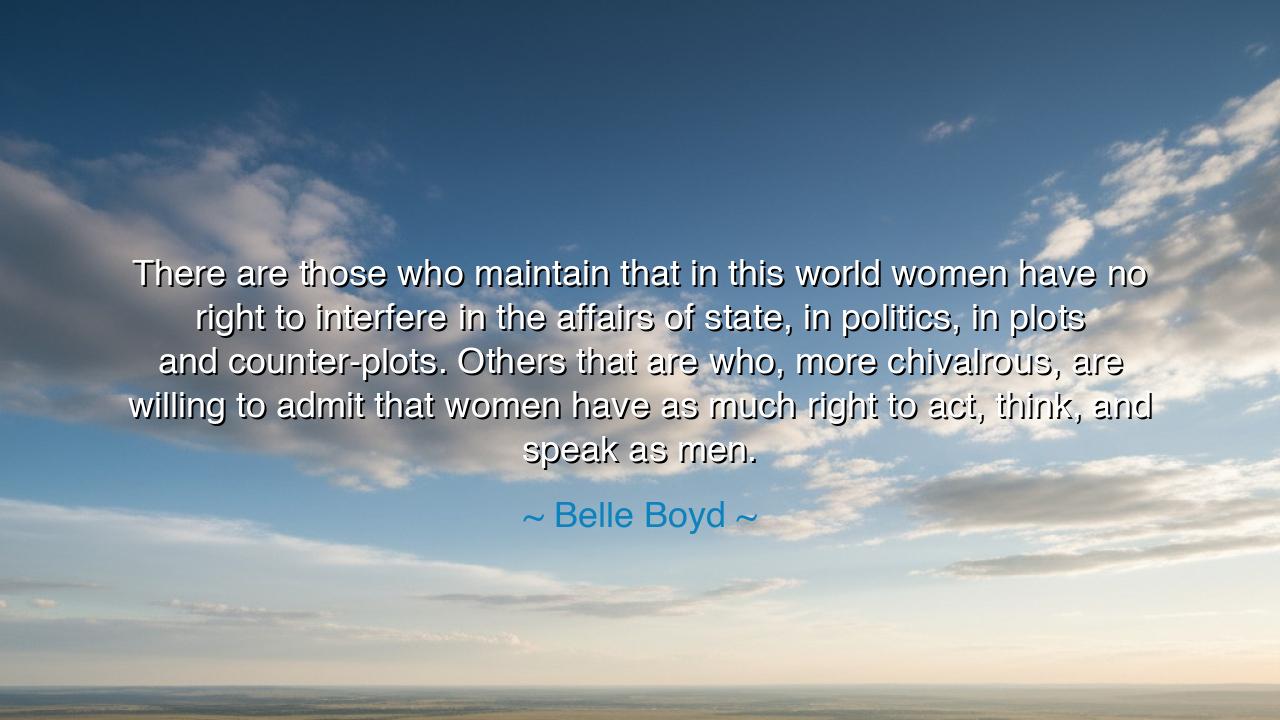
There are those who maintain that in this world women have no
There are those who maintain that in this world women have no right to interfere in the affairs of state, in politics, in plots and counter-plots. Others that are who, more chivalrous, are willing to admit that women have as much right to act, think, and speak as men.






In the words of Belle Boyd, “There are those who maintain that in this world women have no right to interfere in the affairs of state, in politics, in plots and counter-plots. Others there are who, more chivalrous, are willing to admit that women have as much right to act, think, and speak as men.” we hear the proud defiance of a woman who lived in the shadows of intrigue and the light of danger. Boyd, known as the “Cleopatra of the Confederacy,” was a spy during the American Civil War, and through her actions she overturned the myth that women were too delicate or passive to shape the fate of nations. Her words expose the tension between two worlds: one that would confine women to silence, and another that dares to recognize their equal strength.
The origin of this declaration lies in Boyd’s own life. As a Confederate spy, she passed information to generals, evaded capture, and wielded her intelligence with precision. She saw firsthand how the affairs of state and politics were not abstract matters reserved for men, but living forces that touched every home, every family, every heart. To say that women had “no right” to interfere was, to her, both foolish and impossible—women were already involved, whether they chose to be or not. In her view, it was hypocrisy to deny them recognition while benefiting from their sacrifices.
History confirms the truth of her claim. Consider Joan of Arc, who at seventeen led armies in France, guided by vision and conviction, though she was told that war and leadership were the domains of men. Or Elizabeth I of England, who steered her nation through storms of religious conflict and foreign threat, showing that a woman could be as shrewd, as bold, and as powerful as any king. Time and again, women have risen to prove what Boyd declared: that the realm of politics and power belongs not to one sex, but to all humanity.
The deeper meaning of Boyd’s words is not only political but philosophical. To deny women the right to act, think, and speak is to deny the fullness of human reason itself. Half of humanity cannot be silenced without crippling the whole. The affairs of state are built upon justice, and justice is a hollow word if it is granted only to men. By contrasting those who forbid women’s participation with those who admit it, Boyd lays bare the struggle of her age—and indeed, of every age: whether society will choose to diminish itself by exclusion, or ennoble itself through equality.
And yet, Boyd herself acknowledges the strange irony of chivalry. Some men, thinking themselves noble, allowed women to speak and act—not from true recognition of equality, but from gallantry, as though granting a privilege rather than acknowledging a right. Even here she reveals a deeper truth: that equality must not rest on courtesy, but on justice. Women do not need permission to exist as thinking beings; they are born with that right. The task is not for men to bestow it, but for societies to recognize what has always been true.
The lesson for us, O listener, is urgent and enduring. Never accept a world where voices are silenced because of sex, race, or origin. Do not confine greatness to one half of humanity. Instead, honor the right of all to enter the debates of politics, to shape the destiny of nations, to conspire not for destruction but for justice. Remember that those who seek to exclude women diminish not women alone, but the entire human story. To silence them is to rob the world of wisdom.
As for practical action: wherever you find yourself—in the home, in the community, in the workplace—invite women’s voices to be heard and heeded. Encourage their leadership, their thoughts, their boldness. Study the histories of women like Belle Boyd, Joan of Arc, and countless others who defied silence, and let their examples ignite courage in your own heart. Build a world where participation is not a gift given by the powerful, but a right recognized in all.
Thus, Belle Boyd’s words resound across the ages. “Women have as much right to act, think, and speak as men.” They are not the cry of a rebel alone, but the eternal truth of justice. Let it be remembered, let it be lived, and let it guide the generations to come—for only when all voices rise together can the great work of humanity be fulfilled.






AAdministratorAdministrator
Welcome, honored guests. Please leave a comment, we will respond soon